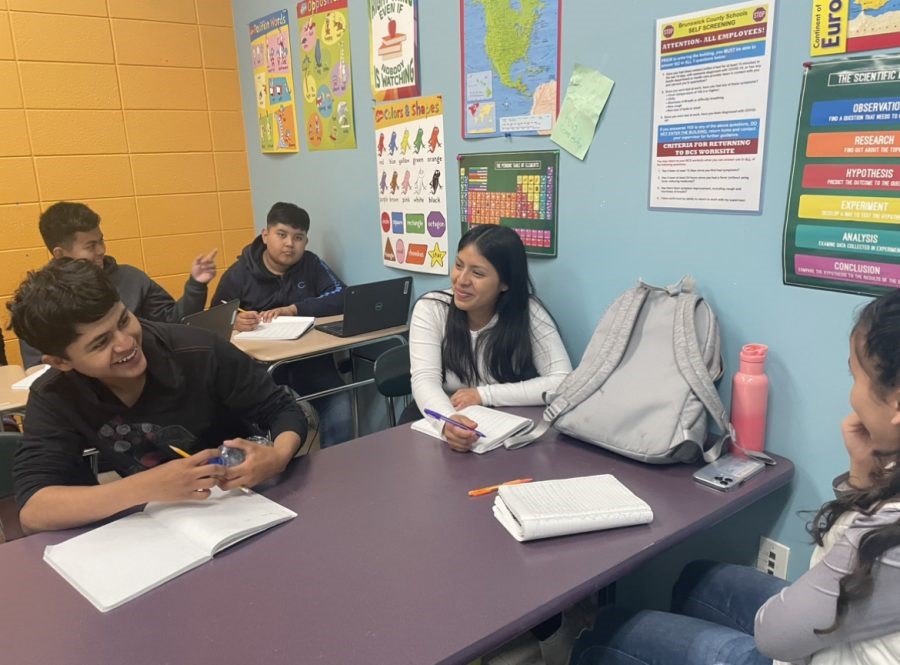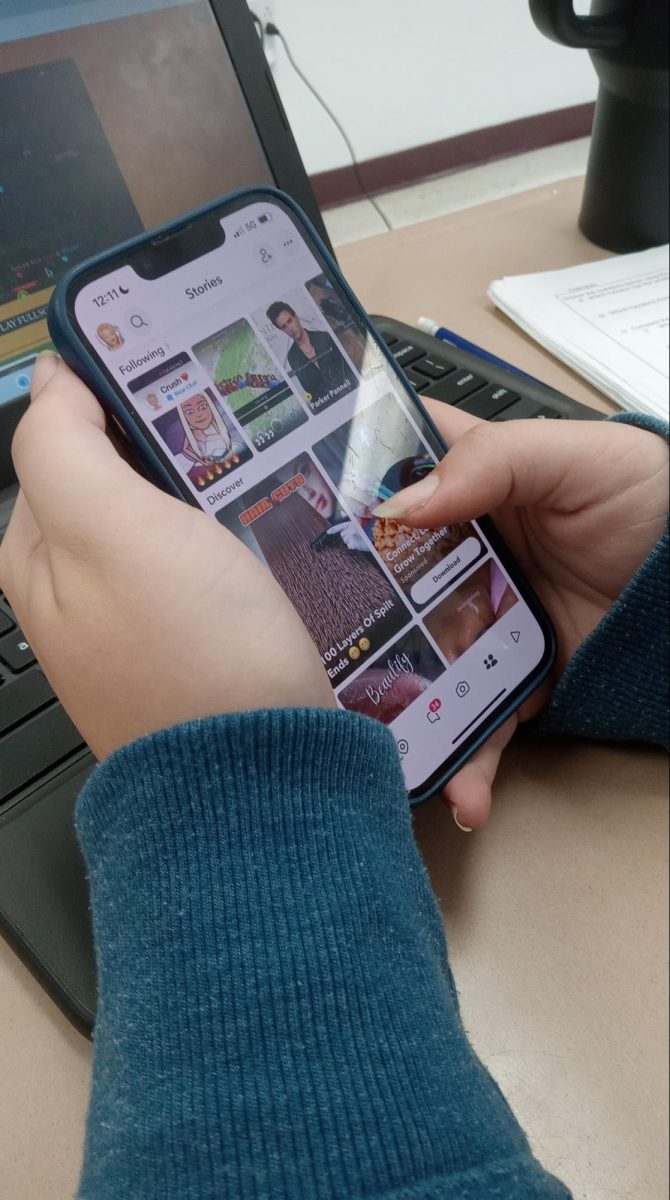We all know the benefits of being bilingual in today’s society. Although, many don’t realize there are a few burdens that come with being bilingual. Being a Spanish and English speaker is far more than just having a larger communication outlet. Bilingual speakers face troubles day to day that many don’t know about and are left carrying burdens.
Todos conocemos los beneficios de ser bilingüe en la sociedad de hoy. Aunque, muchos no se dan cuenta de que hay algunas cargas que conlleva ser bilingüe. Hablar español e inglés es mucho más que tener un medio de comunicación más grande. Los hablantes bilingües enfrentan problemas día a día que muchos no conocen y se quedan con cargas.
“English and Spanish are two of the most common languages in the world,” said junior Joel Llanos. “So you never have problems to communicate with other people and are able to communicate more with others.”
“El inglés y el español son dos de los idiomas más comunes en el mundo,” dijo Joel Llanos, estudiante de tercer año.“Entonces nunca tienes problemas para comunicarte con otras personas y puedes comunicarte más con los demás.”
Being a bilingual speaker, you have a wider communication range. This helps to engage in more social occasions and expands the limit for who you can talk to and get to know. For most Hispanics, Spanish is their first language since that is what is used in their household, and are prone to hearing Spanish since birth. But as they start going to school, they eventually grow to learn English. Often overlooked is how bilingual speakers are left feeling judged when speaking in their first language in public and the possibility of being misunderstood because of an accent or language proficiency.
Al ser un hablante bilingüe, tienes un rango de comunicación más amplio. Esto ayuda a participar en más ocasiones sociales y amplía el límite de con quién puede hablar y conocer. Para la mayoría de los hispanos, el español es su primer idioma ya que es el que se usa en su hogar y son propensos a escuchar español desde que nacen.
“I feel like it happens all the time,” said Llanos. “Sometimes it feels as if they don’t like that you speak a different language, you speak a different language and people look at you weird but there’s nothing you can do.”
“Siento que sucede todo el tiempo”, dijo Llanos. “A veces se siente como si no les gustara que hablas un idioma diferente, hablas un idioma diferente y la gente te mira raro, pero no hay nada que puedas hacer.”
Some foreign students start going to an American public school for the first time, meaning, they will have to learn a brand new language. Adjusting to this change can be very difficult as they are left carrying the burden of feeling like an outcast.
Algunos estudiantes extranjeros comienzan a asistir a una escuela pública estadounidense por primera vez, lo que significa que tendrán que aprender un idioma completamente nuevo. Adaptarse a este cambio puede ser muy difícil, ya que se quedan con la carga de sentirse marginados.
“When I came here I felt like people looked at me really ugly for not knowing English,” said junior Dulce Vasquez. “I think it’s part of the process that you go through when learning a new language, although for me it’s been really hard.”
“Cuando llegué aquí, sentí que la gente me miraba muy mal por no saber inglés”, dijo Dulce Vásquez, estudiante de tercer año. “Creo que es parte del proceso por el que pasas cuando aprendes un nuevo idioma, aunque para mí ha sido muy difícil.”
This is when bilingual speakers are able to step forward and help these foreign students. When learning English, students new to the country may feel like not enough or feel as if they aren’t learning English at the pace they should be. Bilingual speakers help guide the new students and can translate any information the foreign students don’t quite yet understand. This kind of guidance can be comforting to these new students as they are being put into a new environment where they have no idea what is being said around them.
Aquí es cuando los hablantes bilingües pueden poner un pie y ayudar a estos estudiantes extranjeros. Al aprender inglés, los estudiantes nuevos en el país pueden sentir que no son suficientes o que no están aprendiendo inglés al ritmo que deberían. Los hablantes bilingües ayudan a guiar a los nuevos estudiantes y pueden traducir cualquier información que los estudiantes extranjeros aún no entiendan. Este tipo de orientación puede ser reconfortante para estos nuevos estudiantes, ya que se les coloca en un nuevo entorno en el que no tienen idea de lo que se dice a su alrededor.
‘’I had a class in English where it always felt like I had to do the work, and it didn’t matter to my teacher that I only knew Spanish, I mean I wasn’t even allowed to go to ESL,” said Vasquez. “I felt like I wasn’t enough for not knowing two languages but once I learned both, I felt more than enough, and some people may judge me, but at least I know two languages, and I put in the effort to learn the two.”
“Tenía una clase de inglés en la que siempre sentía que tenía que hacer el trabajo, y a mi maestra no le importaba que solo supiera español, quiero decir que ni siquiera me permitían ir a ESL,” dijo Vásquez. “Sentí que no era suficiente por no saber dos idiomas, pero ya cuando aprendí los dos, me sentí más que suficiente, y algunas personas pueden juzgarme, pero al menos sé dos idiomas, y me esforcé por aprender los dos.”
Senior Ashley Gonzalez talks about a time in third grade when she was having a difficult time making friends and a student was told by a teacher to introduce themselves to her since they both spoke Spanish and can communicate.
Ashley González, estudiante de último año, habla sobre un momento en tercer grado cuando estaba teniendo dificultades para hacer amigos y una maestra le dijo a un estudiante que se presentara, ya que los dos hablaban español y podían comunicarse.
“I would literally walk laps around the playground every single day and I would do it out of fun because I had no one to talk to,” said Gonzalez. “I didn’t take it in any wrong way when the teachers helped. I guess that kind of gave me a push to make friends.”
“Literalmente daba vueltas alrededor del patio de recreo todos los días y lo hacía por diversión porque no tenía con quién hablar,” dijo González. “No me lo tomé a mal cuando las maestras me ayudaron, supongo que eso me dio un empujón para hacer amigos.”
Children of immigrant parents carry so much weight on their shoulders. Their parents know the basics of English but are usually not comfortable speaking it, leaving it up to their children to translate any legal documents, make phone calls for them, etc. As the children of immigrants are given the opportunity to go to school (unlike many of their parents) they can learn a new language–English. While this can be a helpful way for children to support their parents as they navigate life in a new country, it can also be a burden, as it can be mentally and emotionally draining to constantly switch between languages and act as an interpreter.
Los hijos de padres inmigrantes llevan tanto peso sobre sus hombros. Sus padres conocen los conceptos básicos de inglés, pero por lo general no se sienten cómodos hablándolo, y dejan que sus hijos traduzcan cualquier documento legal, hagan llamadas telefónicas por ellos, etc. Como los hijos de inmigrantes tienen la oportunidad de ir a la escuela (a diferencia de muchos de sus padres) pueden aprender un nuevo idioma: el inglés. Este puede ser una forma útil para que los niños apoyen a sus padres mientras navegan por la vida en un nuevo país. Pero, también puede ser una carga, ya que cambiar constantemente de idioma y actuar como intérprete puede ser mental y emocionalmente agotador.
‘’My mom doesn’t speak English, so growing up I had to learn English fast, literally, I learned in like three months,” said Gonzalez. “It was a big pressure. I was seven: literally a child over here translating some government papers.”
“Mi mamá no habla inglés, así que al crecer tuve que aprender inglés rápido, literalmente lo aprendí en unos tres meses,” dijo González. “Fue una gran presión. Tenía siete años: literalmente, un niño aquí traduciendo algunos documentos del gobierno.”
There are many more burdens I feel aren’t talked about enough, like where the rules or vocabulary of one language may interfere with the other and the potential for discrimination from monolingual individuals or society as a whole. But overall, being bilingual is a privilege that one should not be ashamed to have and should be used to its greatest advantage.
Hay muchas más cargas de las que siento que no se habla lo suficiente, como cuando las reglas o el vocabulario de un idioma pueden interferir con el otro y el potencial de discriminación de las personas monolingües o de la sociedad en general. Pero en general, ser bilingüe es un privilegio que uno no debe avergonzarse de tener y debe usarse para su mayor beneficio.













